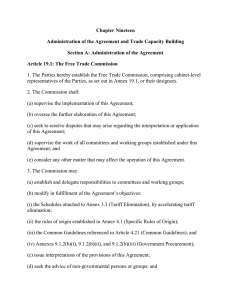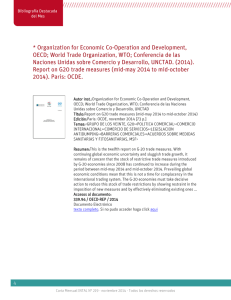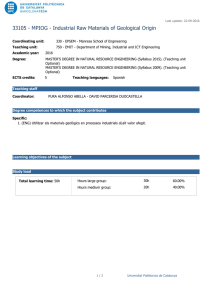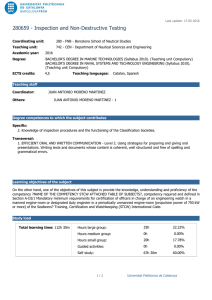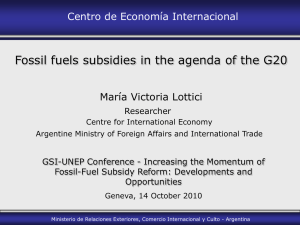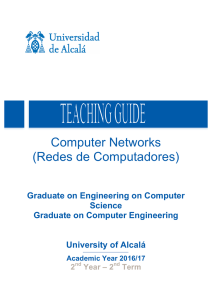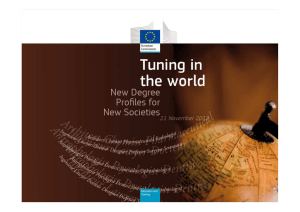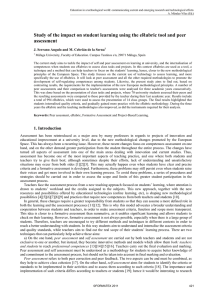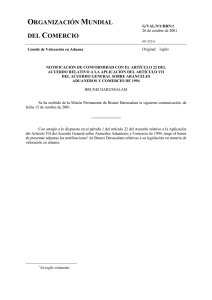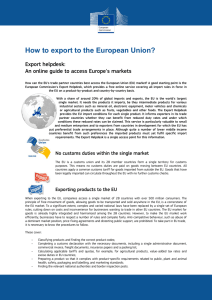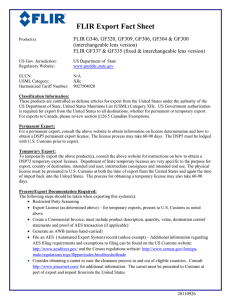international trade
Anuncio
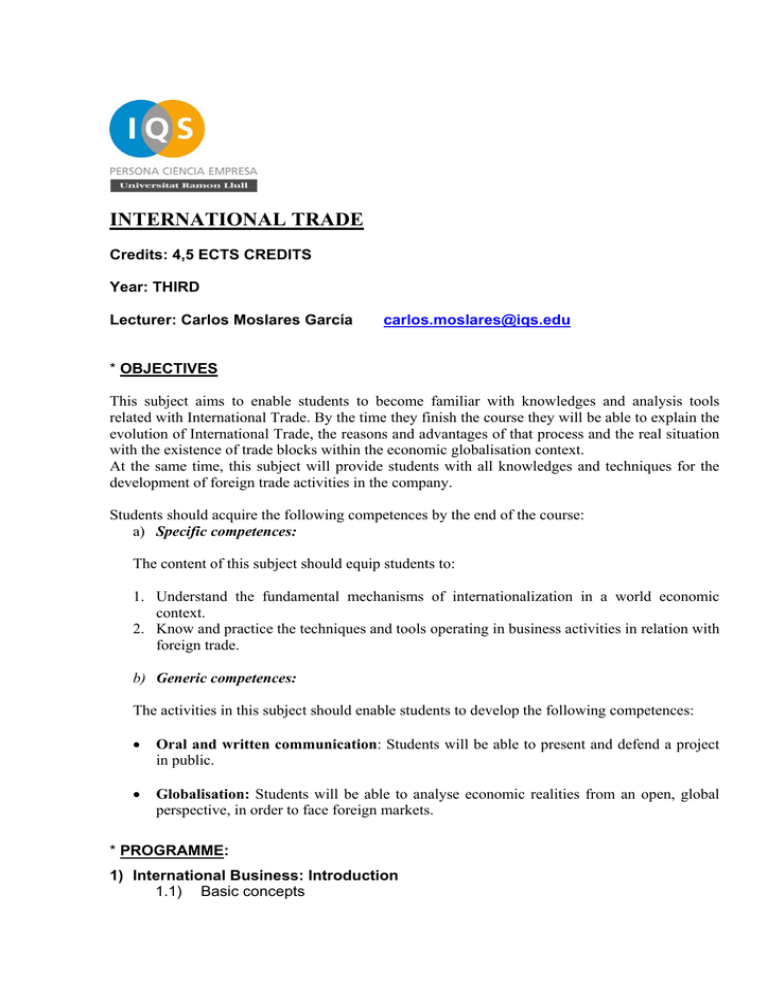
INTERNATIONAL TRADE Credits: 4,5 ECTS CREDITS Year: THIRD Lecturer: Carlos Moslares García carlos.moslares@iqs.edu * OBJECTIVES This subject aims to enable students to become familiar with knowledges and analysis tools related with International Trade. By the time they finish the course they will be able to explain the evolution of International Trade, the reasons and advantages of that process and the real situation with the existence of trade blocks within the economic globalisation context. At the same time, this subject will provide students with all knowledges and techniques for the development of foreign trade activities in the company. Students should acquire the following competences by the end of the course: a) Specific competences: The content of this subject should equip students to: 1. Understand the fundamental mechanisms of internationalization in a world economic context. 2. Know and practice the techniques and tools operating in business activities in relation with foreign trade. b) Generic competences: The activities in this subject should enable students to develop the following competences: Oral and written communication: Students will be able to present and defend a project in public. Globalisation: Students will be able to analyse economic realities from an open, global perspective, in order to face foreign markets. * PROGRAMME: 1) International Business: Introduction 1.1) Basic concepts 1.2) 1.3) 1.4) 1.5) 1.6) Earnings derived from international business Scale Economies and Products Differentiation. Creation of trade blocks facing GATT and WTO. Balance of payments and exchange rates Evolution of Spanish foreign trade 2) International Business and its relationship with the company 2.1) Analysis of the company: Decisions to export 2.2) Organization of the company to face foreign trade 2.3) Ways to face foreign trade 2.4) Sources of information 2.5) Evolution of Spanish companies in international markets 3) Legal regime and Customs arrangement of Foreign Trade 4.1) Fundamentals of EC Customs Policy 4.2) EC Customs Law 4.3) Customs tax system 4.4) EC Customs destinations 4) Logistics and International Transport 5.1) Logistics and transport 5.2) Goods International Transport 5.3) International trade and transport: Incoterms 5.4) Legal-economic protection of goods: the insurance 5) Tools to support export activities 6.1) Financial tools to support export activities 6.2) Commercial tools to support export activities 6.3) Tax tools to support export activities 6) Financing Foreign Trade Activities 7.1) Transactions in Foreign Exchange market 7.2) Exchange risk and its coverage 7.3) Financial modes of foreign trade transactions 7) Options for Billing and Delivering Payments in International Trade 8.1) Cash and check payments 8.2) Bank transfer and payment order 8.3) Transfer of funds: simple and documented 8.4) Documented loan 8) International Agreements 9.1) General Rules in international agreements 9.2) International Purchase agreement 9.3) Agreements in Business Mediation 9.4) Joint Venture 9.5) Franchises * TRAINING ACTIVITIES: The training activities for this subject are as follows: TRAINING ACTIVITIES Proportion A. Lectures presenting concepts and procedures 28 % B. Practical sessions (exercises, case resolution) 10% C. Assignments 15% D. Seminars or tutorials 8% E. Personal study activities 33% F. Assessment sessions 6% * ASSESSMENT SYSTEMS: Assessment system 1. Continuous-assessment tests (1) 2. Classroom activities (exercises, discussion of practical cases, etc.) 3. Assignments and presentations 4. Projects (these must be presented and defended) 5. Final assessment or exam (2) Proportion 10 % 15 % 60% 15 % (2) Notes: (1) Over the course of the term there will be continuous-assessment tests to evaluate students’ achievement of the learning objectives for the subject in terms of specific and generic competences. (2) The final assessment or exam is for those students who failed one of the terms. In the first term, students study and are assessed on topics 1, 2 and 3 from the programme. The second term covers topics 4, 5, 6 and 7. Finally, the third term covers topics 8, 9, 10 and 11. A mark of at least 4 is required in mid-term exams to count towards the final mark. Attendance is considered necessary to sit the exams. Assessment of competences: The procedures used aim to assess both the specific competences for the subject and the generic competences associated with the subject. The generic competences are: - Oral and written communication Globalisation. The following procedures are used to assess these competences: Oral and written communication: Presentation and defence of a project about a product or service in foreign markets. Globalization: The idea of a foreign market is presented in the project. * BIBLIOGRAPHY: Bibliography: - Boixadós, R. “El comercio internacional. Incertidumbres y soluciones” Ed. Pirámide - Granell, F. “La exportación y los mercados internacionales” Ed. Hispano Europea - Luis Molina Martínez “ El Crédito Documentario y sus Documentos” Fc Editorial 2001 - Carlos Andraos Khordk “Guía Práctica de Tramitación de Comercio Exterior” Edit Fundación Confemetal - Palmés Comballa, Remigi. “Cómo usar bien los Incoterms” ICG Marge Editorial 2005 - ICEX “Curso de Comercio Exterior Avanzado” 2006 - Krugman P. Obstfeld M. “Economía Internacional” McGraw Hill 2006 - Tugores J. “Economía Internacional: Globalización e Integración Regional” (2002) - Diez Vergara, Marta “Manuel Práctico de Comercio Internacional” (2001) - Caballero Míguez, Iria; Padín Fabeiro, Carmen. “ Comercio Internacional: Una visión general de los instrumentos operativos del Comercio Exterior” IdeasPropias Editorial 2006 - Bernal Tures, Paloma; Mercado Idoeta, Carmelo. “Técnicas y Prácticas de Comercio Exterior” Edit Universidad Rey Juan Carlos , 2006 WEB pages of interest: www.ine.es www.bde.es www.idescat.com www.mcx.es http://datacomex.mcx.es/principal_comex_ue.aspx http://export-help.cec.eu.int/index_es.html http://ec.europa.eu/taxation_customs www.economist.com www.imf.org www.wto.org www.oecd.org www.worldbank.org http://europa.eu.int http://globalization.about.com www.un.org www.iadb.org www.ecb.int http://mkaccdb.eu.int www.icex.es
